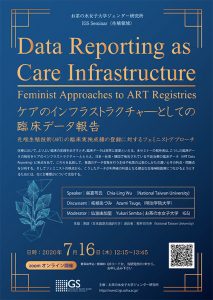International IGS Seminar “Data Reporting as Care Infrastructure: Feminist Approaches to ART Registries”
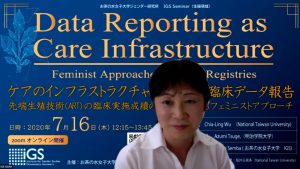 The Institute for Gender Studies (IGS) held the first IGS international online seminar on July 16, 2020, using a Zoom Webinar. We invited Professor Chia-Ling Wu of National Taiwan University, and she gave a presentation titled Data Reporting as Care Infrastructure: Feminist Approaches to ART Registries. After her presentation, Professor Azumi Tsuge of Meiji Gakuin University made comments, and we had a Q&A session with the participants. Dr. June-Ok Ha, a senior curator of the National Museum of Korean Contemporary History in South Korea, joined us from South Korea for the discussion after Professor Tsuge’s comments, because she is a research collaborator of Professor Wu. Sixty-four people from Japan and abroad participated in the seminar because we arranged Japanese–English consecutive interpretation. One quarter of the people who signed up for the seminar was from Taiwan, South Korea, and the United States.
The Institute for Gender Studies (IGS) held the first IGS international online seminar on July 16, 2020, using a Zoom Webinar. We invited Professor Chia-Ling Wu of National Taiwan University, and she gave a presentation titled Data Reporting as Care Infrastructure: Feminist Approaches to ART Registries. After her presentation, Professor Azumi Tsuge of Meiji Gakuin University made comments, and we had a Q&A session with the participants. Dr. June-Ok Ha, a senior curator of the National Museum of Korean Contemporary History in South Korea, joined us from South Korea for the discussion after Professor Tsuge’s comments, because she is a research collaborator of Professor Wu. Sixty-four people from Japan and abroad participated in the seminar because we arranged Japanese–English consecutive interpretation. One quarter of the people who signed up for the seminar was from Taiwan, South Korea, and the United States.
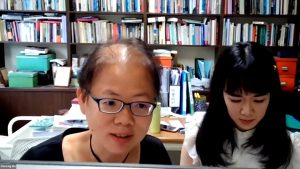 Professor Wu has been interested in women’s reproduction and newborns by assisted reproductive medical technology (ART) from a feminist point of view. She has conducted research regarding the collection and analysis of clinical data of ART in Taiwan, Japan, and South Korea with Professor Tsuge and Dr. Ha. They published “Data Reporting as Care of Infrastructure: Assembling ART Registries in Japan, Taiwan, and South Korea” in an academic journal, East Asian Science, Technology and Society: An International Journal (14, pp.35–59) in 2020. In this seminar, she talked about whether the data collected by each country were used for the care of women who are considering infertility treatments or becoming pregnant by ART and about newborns and their other research findings. How the data related to ART have been used for the development of evidence-based policies regarding ART practices and promoting the interests and health of women and offspring were also discussed.
Professor Wu has been interested in women’s reproduction and newborns by assisted reproductive medical technology (ART) from a feminist point of view. She has conducted research regarding the collection and analysis of clinical data of ART in Taiwan, Japan, and South Korea with Professor Tsuge and Dr. Ha. They published “Data Reporting as Care of Infrastructure: Assembling ART Registries in Japan, Taiwan, and South Korea” in an academic journal, East Asian Science, Technology and Society: An International Journal (14, pp.35–59) in 2020. In this seminar, she talked about whether the data collected by each country were used for the care of women who are considering infertility treatments or becoming pregnant by ART and about newborns and their other research findings. How the data related to ART have been used for the development of evidence-based policies regarding ART practices and promoting the interests and health of women and offspring were also discussed.
In Japan, the ART clinical data have been collected by the Japan Society of Obstetrics and Gynecology (JSOG). Most of the fertility hospitals and clinics have reported their clinical results for the report, published by JSOG annually, to promote safe ART and medical progress. The report is open to the public, and the problematic cases and complications of women who used ART during their pregnancy and childbirth and the incidence of multiple births and impediments can be observed. In Taiwan and South Korea, the ART clinical data are collected by the governments and not open to the public. The purpose of data collection in both countries is to demonstrate domestically and abroad their high level of ART. Therefore, they have tended to focus on the birth number, and the problematic cases are not collected. In addition, the rate of multiple births and concomitant medical problems are not provided, despite many multiple embryo transfers having been implemented at a high success rate. Prof. Wu argued that Japanese ART data collection is functioning well as a care infrastructure.
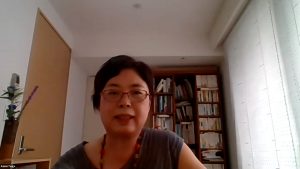 After Prof. Wu’s presentation, Prof. Azumi Tsuge briefly introduced the background and current situation of Japan’s ART data collection and disclosure system and then asked questions about and made comments on Wu’s presentation. Tsuge first said that using clinical data of ART as infrastructure for care is a relevant approach. In Japan, the JSOG takes the lead in publishing statistics on ART data, and although each clinic is not mandated to report ART data, most ART facilities report the data voluntarily. In Taiwan, ART statistics collection is led by the government, and the law regulates data reporting by medical institutions. Tsuge’s first question was what are the advantages and disadvantages of the infrastructure of ART data statistics by a government and regulating the reporting by law. Wu answered the question as follows. The advantage is that data collection is thorough in a nation, and the disadvantage is that fertility clinics and doctors report only the mandatory data to the government because of a top-down approach. Thus, there is insufficient.
After Prof. Wu’s presentation, Prof. Azumi Tsuge briefly introduced the background and current situation of Japan’s ART data collection and disclosure system and then asked questions about and made comments on Wu’s presentation. Tsuge first said that using clinical data of ART as infrastructure for care is a relevant approach. In Japan, the JSOG takes the lead in publishing statistics on ART data, and although each clinic is not mandated to report ART data, most ART facilities report the data voluntarily. In Taiwan, ART statistics collection is led by the government, and the law regulates data reporting by medical institutions. Tsuge’s first question was what are the advantages and disadvantages of the infrastructure of ART data statistics by a government and regulating the reporting by law. Wu answered the question as follows. The advantage is that data collection is thorough in a nation, and the disadvantage is that fertility clinics and doctors report only the mandatory data to the government because of a top-down approach. Thus, there is insufficient.
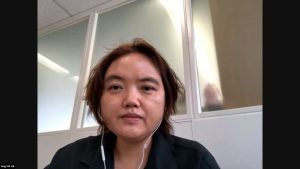 Tsuge also argued that ART risk governance has improved in Japan because infants’ risks such as increased births of ultra-low weight infants are more paid attention to than the risks to infertile women and that the judicial cases of ovarian hyper stimulation syndrome (OHSS) affected the collection of OHSS data. Thus, she thought that the feminist approach had limitations in the construction of Japan’s ART statistics. Her second question was what was essential in practicing the feminist approach in the constitution of ART statistics. Wu replied that the statistics should not be used for merely showing the high level of ART in the countries; it should be used for making ART safer for women and infants. Therefore, Wu answered that many people with diverse positions including feminist activists and parties should be involved with policymaking on ART.
Tsuge also argued that ART risk governance has improved in Japan because infants’ risks such as increased births of ultra-low weight infants are more paid attention to than the risks to infertile women and that the judicial cases of ovarian hyper stimulation syndrome (OHSS) affected the collection of OHSS data. Thus, she thought that the feminist approach had limitations in the construction of Japan’s ART statistics. Her second question was what was essential in practicing the feminist approach in the constitution of ART statistics. Wu replied that the statistics should not be used for merely showing the high level of ART in the countries; it should be used for making ART safer for women and infants. Therefore, Wu answered that many people with diverse positions including feminist activists and parties should be involved with policymaking on ART.
The participants had many questions and comments from participants, and we actively discussed the issue.
Reported by SEMBA Yukari
Project Research Fellow, IGS, Ochanomizu University
|
《Event Details》 【Date/Time】July 16, 2020, 12:15–13:45 (JST)/11:15–12:45 (CST |


